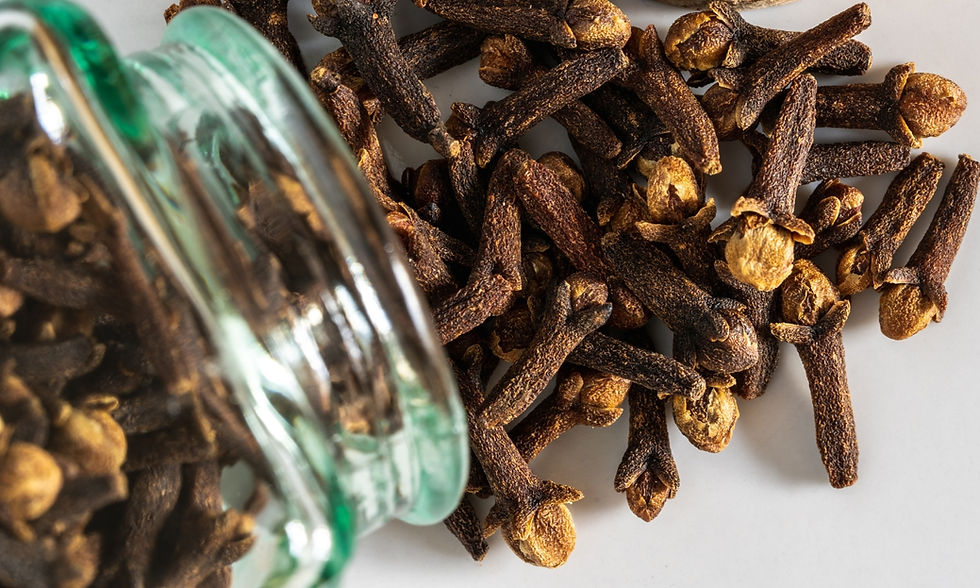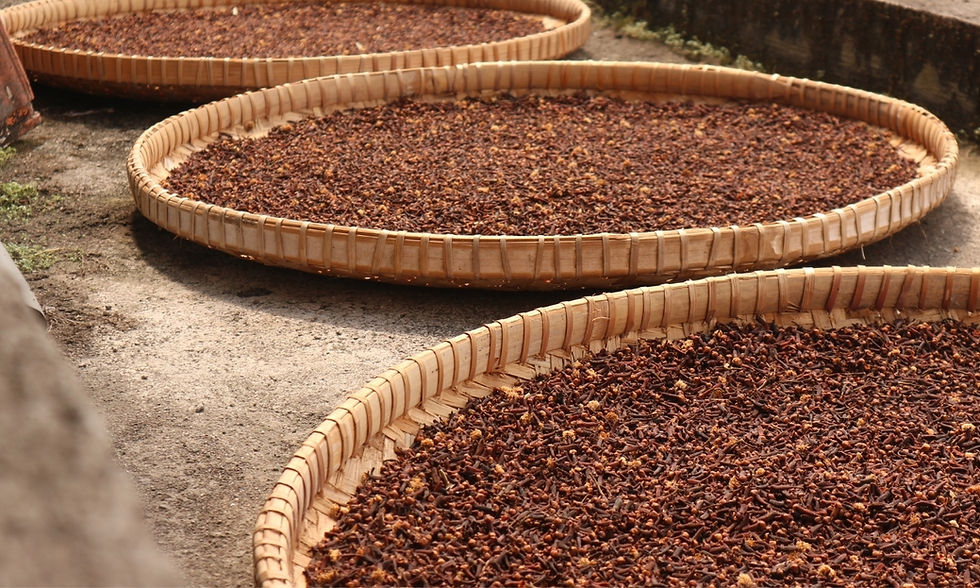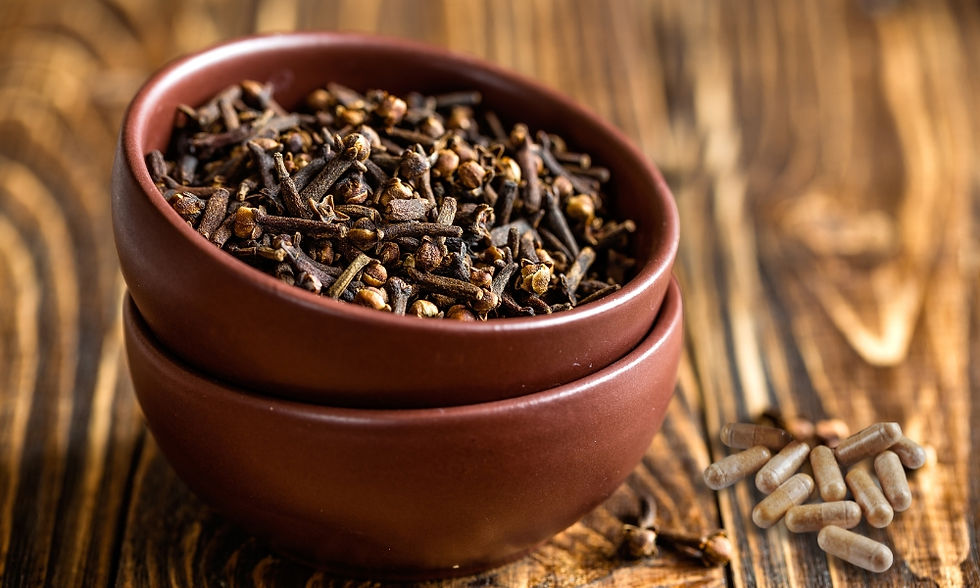Herbal Beauty Hacks with Clove
- Herbs around us
- Sep 23, 2025
- 4 min read
Updated: Oct 30, 2025
In the modern clean beauty movement, herbs are reclaiming their place in skincare—and clove is emerging as a superstar. While it’s best known for digestive or immune support, clove extract and fresh cloves are now making waves in the world of DIY beauty. This spice, rich in eugenol and antioxidants, offers a natural way to fight acne, clarify the scalp, and enhance hair shine. With organic ingredients gaining popularity in the U.S. and Australia, beauty enthusiasts aged 20 to 40 are turning to clove-based homemade remedies for safer, more effective self-care.

Image: Canva
Homemade Clove Face Mask for Acne Control
Clove extract organic is known for its strong antibacterial and anti-inflammatory effects. When applied to the skin in diluted form, it may help reduce acne-causing bacteria and soothe inflamed skin. A DIY clove face mask is simple to prepare and often combines ground cloves or clove extract with other skin-calming ingredients.
Here's how a clove face mask works:
The eugenol in clove targets Propionibacterium acnes, the bacteria associated with breakouts.
Its anti-inflammatory properties reduce swelling, helping blemishes appear smaller and less red.
The spice also contains antioxidants that support skin healing and reduce dark marks left behind by acne.
A popular blend includes ½ tsp clove powder, 1 tsp organic honey, and a few drops of aloe vera gel. This mixture, applied for 5–7 minutes, can act as a purifying and toning mask. Always test a small area first, especially if you have sensitive skin.
Recent anecdotal trends on TikTok and Reddit’s DIY beauty communities show increasing popularity for clove in skincare—especially among users seeking chemical-free solutions that target both acne and pigmentation without harsh side effects. It’s not uncommon to find posts sharing week-by-week results from clove-based skincare, usually paired with turmeric or sandalwood.
Clove Hair Rinse for Shine and Growth
If your hair feels dull or lifeless, clove might be the herbal boost it needs. Traditionally used in Indian and Indonesian haircare routines, clove water or clove oil-infused rinses are gaining attention on platforms like Instagram and YouTube.
Clove’s natural stimulants help:
Improve scalp circulation, which encourages healthy hair growth.
Reduce dandruff thanks to its antifungal and antiseptic properties.
Add a natural shine without synthetic silicones or residue.
To make a simple clove rinse:
Boil 10–15 whole organic cloves in 2 cups of water for 10 minutes.
Let the mixture cool and strain out the cloves.
Pour the clove water onto your scalp and hair after shampooing. Leave it on for 5–10 minutes, then rinse with cold water.
Some people also add a splash of apple cider vinegar for extra scalp detox, or a few drops of rosemary oil to enhance hair growth benefits. Compared to commercial tonics, clove rinses offer a gentler, fragrance-rich alternative with a warm, comforting scent.
Blending Clove with Other Herbs
Combining organic cloves with other herbal ingredients can amplify their effects, making DIY beauty rituals more effective and tailored. For acne, turmeric pairs well with clove powder due to its curcumin content—both support inflammation control and skin healing. A common mask mixture combines turmeric, clove powder, and yogurt, offering brightening effects for oily and acne-prone skin.
When it comes to hair care, lemon juice and aloe vera are ideal companions for clove water rinses. Lemon adds natural acidity, helping remove buildup and tighten follicles, while aloe’s polysaccharides hydrate and repair the scalp. Together with clove’s antifungal properties, these ingredients can create a weekly scalp tonic that’s nourishing and clarifying.
A balancing hair tonic might include:
1 cup clove water (cooled)
1 tablespoon aloe vera gel
1 teaspoon fresh lemon juice
Shake and apply it to clean, damp hair. Let it sit for 15 minutes before rinsing. This formula works best for those experiencing mild dandruff or seasonal scalp irritation, especially in humid or dry climates like parts of Australia and the southern U.S.
The beauty of clove lies in its versatility—whether mixed with essential oils, clay, herbal extracts, or hydrosols, it adapts to a range of DIY formats. However, it’s essential to avoid overuse and learn how to blend these ingredients correctly.
Safety Tips for DIY Skincare with Clove
Clove’s high eugenol content, while beneficial, can be irritating or sensitizing for some people—especially when applied in high concentrations or too frequently. A patch test behind the ear or on the inner elbow is highly recommended before full use.
Key safety practices include:
Always dilute clove oil with a carrier oil like jojoba or coconut before applying to the skin or scalp.
Avoid contact with eyes, mucous membranes, and broken skin.
Do not use clove masks or rinses more than twice per week to prevent dryness or irritation.
For sensitive skin types, use steam-distilled clove water or clove hydrosol as a gentler alternative to direct extract or powder.
Pregnant or breastfeeding women should consult a healthcare provider before applying herbal oils like clove to the skin. While the topical use of clove extract is generally safe in cosmetic quantities, individual reactions vary. Seek professional advice if you have eczema, rosacea, or underlying skin conditions.
Today’s clove-based beauty hacks are inspired by both traditional herbal knowledge and modern skincare science—but it’s important to treat them with the same care you would give to conventional products. When used responsibly, organic cloves can transform basic skincare routines into deeply nourishing rituals.
References
National Center for Complementary and Integrative Health. Clove (Syzygium aromaticum) Monograph. 2023.
USDA FoodData Central. Nutrient Profile of Clove Buds. 2022.
Journal of Ethnopharmacology. Anti-inflammatory effects of eugenol in skin models. 2020.
PubMed Central. Antibacterial properties of clove extract in topical preparations. 2021.
International Journal of Trichology. Clove and Hair Growth: A Comparative Study with Herbal Oils. 2019.















